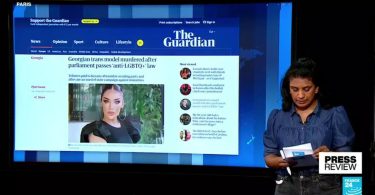Cardinal Robert McElroy
A top U.S. cardinal has said opposition to Fiducia Supplicans, the Vatican declaration allowing blessings for couples in “irregular” situations, is due to “an enduring animus among far too many toward LGBT persons.”
Cardinal Robert McElroy of San Diego noted the contrast between intense opposition to blessing same-gender couples in the U.S. and elsewhere while criticism of other “irregular couples” was limited. Crux reported:
““It is particularly distressing in our own country that the opposition to Fiducia focuses overwhelmingly on blessing those in same-sex relationships, rather than those many more men and women who are in heterosexual relationships that are not ecclesially valid,’ said McElroy, who’s widely seen as a leader of the progressive wing of the American church and a strong Francis supporter.
“‘If the reason for opposing such blessings is really that the practice will blur and undermine the commitment to marriage, then the opposition should, one thinks, be focusing at least equally on blessings for these heterosexual relationships in our country,’ he said.
“‘We all know why it is not,’ McElroy said, attributing it to ‘an enduring animus among far too many toward LGBT persons.’”
McElroy, as he did previously in a letter to San Diego’s priests, said he was allowing the new blessings in his diocese, but that it was “wholly legitimate” for priests not to perform blessings if the priest “believes that to do so would undermine the strength of marriage.” The cardinal affirmed that no doctrinal changes were made.
McElroy, speaking at the Archdiocese of Los Angeles’ Religious Education Congress, which draws some 30,000 attendees annually, also said responses to Fiducia Supplicans signaled a shift towards decentralization in the church:
“‘We have witnessed the reality that bishops in various parts of the world have made radically divergent decisions about the acceptability of such blessings in their countries, based substantially on cultural and pastoral factors as well as neo-colonialism. . .This is decentralization in the life of the global Church.’ . . .
“‘This decentralization must not obscure in any manner the religious obligation of every local church in justice and solidarity to protect LGBT persons in their lives and equal dignity.’”
Addressing LGBTQ+ inclusion in the church more broadly, McElroy said it was a “searing question,” evident from how “immensely prominent” the issue was in the Synod on Synodality the past two years:
“[McElroy said:] Anguished voices within the LGBT communities, in unison with their families, cried out against the perception that they are condemned by the Church and individual Catholics in a devastating way.’
“Yet McElroy conceded that among the bishops and other participants gathered in Rome, there was disagreement on the subject, listing it among what he called areas of ‘deep divide’ in the assembly. The others included how to empower laity without undercutting the hierarchical nature of the church, the extent and limits of inculturation and decentralization, and the possible ordination of women deacons.”
The synodal process, however, has exposed the need for the church to reconsider its teachings and practices, he observed, commenting: “It is becoming clear that on some issues, the understanding of human nature and moral reality upon which previous declarations of doctrine were made were in fact limited or defective.”
Cardinal McElroy’s latest comments are not the first time he has identified anti-LGBTQ+ prejudice as a problem in the church. In 2023, he wrote that a “profound and visceral animus” against LGBTQ+ people in the church is a “demonic mystery of the human soul.” In 2019, he condemned judgementalism among Catholics that prohibits a more welcoming church and drives many young people away. In 2017, McElroy called right wing attacks against LGBTQ+ advocates, including Fr. James Martin, a “wake up call” for the faithful to proactively fight homophobia. In 2016, he was one of only a few U.S. prelates who named anti-LGBTQ+ hate as a reason for the Pulse Nightclub massacre.
This coming Sunday, February 25, 2024 at 4:00 p.m. Eastern U.S. Time, New Ways Ministry will host a webinar, “Being Blessed: The Challenge of Fiducia Supplicans,” to discuss the declaration and its reception globally. The panelists will be Xavier Montecel, a theologian who studies the interaction of liturgy and ethics; Yunuen Trujillo, who works on pastoral outreach to LGBTQ+ Catholics; and SimonMary Aikhiokai, a theologian who studies religion, race, and decolonization across multiple contexts. The panelists’ remarks will be followed by a question and answer period.
For more information and to register, click here.
—Robert Shine (he/him), New Ways Ministry, February 19, 2024







